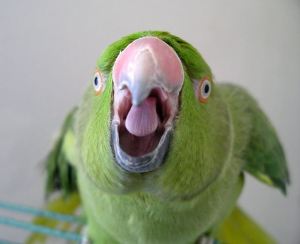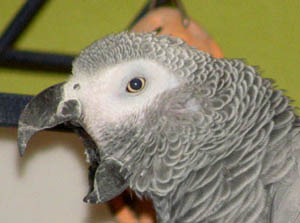Parrots, Problems, and the Power of the Positive
It happens every year. Birds scream. People scream back. As the days get longer and temperatures start to climb, the screaming gets worse. Some pet parrots scream all year long, but many scream louder when their hormonal clocks get wound up in spring as they are looking to mate.
The fact is that birds in the wild scream. They scream at dawn to wake each other up and to start to forage for breakfast. They scream at dusk when they get back together as a flock to eat dinner. But what may be a natural behavior for them in the wild is a socially unacceptable annoyance to many parrot owners, especially if they and their birds live in small apartments with neighbors who don’t share their love for these feathered companions. So, what do these pet owners do when their parrots scream? Unfortunately, they start to scream back, only making the situation worse.
Birds in captivity scream for different reasons. They generally don’t scream to wake others up or to round their flock mates up for food. Rather, most pet parrots scream for their owners’ attention. They scream, and their owners come to them (even if just to scream back at them to stop screaming). And so the cycle of positive reinforcement of the screaming behavior begins. Parrot screams, owner comes, what will happen next? Parrot will continue to scream so owner will continue to come, and so on, and so forth…
Screaming is not the only behavior that parrot owners unknowingly reinforce. Biting is another one. Bird owners will often hold out their hands for their birds to step up; yet, if the birds don’t want to step up at that moment, they may bite the hands. As a result, owners may scream (giving attention to the birds unwittingly) and remove their hands (reinforcing the biting because now the birds no longer have to step up). Another cycle is established.
So, what are pet owners to do if their animals are screaming and biting and driving them nuts? All too often, owners give up on these relationships, either ignoring their birds completely or giving them away to others who are more tolerant. This happens even more after they have owned the birds for a few years, when the birds reach sexual maturity. What is unfortunate is that with just a few minutes a day of work, many of these relationships can be salvaged, and birds owners can learn to enjoy their birds again.
As my mentor, Dr. Susan Friedman taught me, behavior doesn’t occur in a vacuum. All behavior is learned, in part, either to get something good (i.e. attention from an owner) or to avoid something bad (i.e. having to step up on a hand when you don’t want to). This is true for all behaviors performed by both animals and people. Think about it: behaviors are perpetuated because they accomplish something for their performers. Why else would these behaviors be repeated if they didn’t?
What I teach bird owners who come to me with behavior problems is that they can use the principle of positive reinforcement to help solve these behavior issues. Positive reinforcement in this situation means rewarding the pet’s behavior with something uniquely valuable to that pet (i.e. a food treat, a head scratch, verbal praise, etc.). What is rewarding to one pet might not be to another, so it is essential that an owner try to figure out what makes his particular animal happy. If an owner positively reinforces what he considers a more socially acceptable behavior that his pet already knows (such as tapping his beak on the cage) to get attention or to let the owner know that he doesn’t want to step up, the animal will no longer have to perform the socially unacceptable behavior of screaming to accomplish the same end. Eventually, the screaming behavior will go away if it is no longer positively reinforced, as the beak tapping is; the screaming is no longer as rewarding as the more socially acceptable behavior of beak tapping.
Pet owners also can teach animals new behaviors (such as ringing a bell) by positively reinforcing these behaviors even if they occur accidentally or unpredictably. Eventually, these newly learned behaviors may be used to help replace problem behaviors if these new behaviors can be reinforced in the situations that usually elicit the problem behavior. So, if you own a bird or other pet with a problem behavior and you are willing to work at it, problems behaviors can be eliminated, and the pet-owner bond can be rekindled. Remember, however, that animals aren’t machines; like us, they are allowed to have good days and bad, and when training new behavior, a pet may take three steps forward and an occasional step back. There is no magic pill or overnight solution to problem behaviors, but with a little daily practice and a lot of patience and dedication, you and your pet can learn to live happily together once again.
Recent Posts
Tips for Winterizing Your Reptile
By Dr. Laurie Hess When cold weather comes, especially in areas that experience significant climate changes as…
Did You Know That Turtles Shed?
People are sometimes surprised by this question but, like other reptiles, turtles DO shed! While snakes regularly…
Do Ferrets Need Vaccines?
Few of the exotic pet species that we see at The Veterinary Center require vaccinations, but ferrets…
Lead Toxicity in Exotic Pets
Have You Heard About Lead Toxicity? Exposure to lead and other heavy metals can affect multiple body…
Importance of Hydration in Westchester County, NY
With summer temperatures approaching, water is especially essential to your pet’s health. Hydration is needed to regulate…
About Veterinary Centers for Birds and Exotics
If you have been looking for specialized care for your bird or exotic pet, look no further! We have you covered. At our unique animal hospital, we provide care to birds and exotics ONLY—no cats and dogs! We are the only bird and exotic veterinary hospital with a full-time, board certified bird specialist, Dr. Laurie Hess. Dr. Hess, who, with her two associates, Dr. Amanda Marino and Dr. Amanda Dewey, are the only full-time veterinarians in Westchester County who are residency-trained in bird and exotic medicine and surgery. Call to schedule an appointment for your pet!


 Birds in captivity scream for different reasons. They generally don’t scream to wake others up or to round their flock mates up for food. Rather, most pet parrots scream for their owners’ attention. They scream, and their owners come to them (even if just to scream back at them to stop screaming). And so the cycle of positive reinforcement of the screaming behavior begins. Parrot screams, owner comes, what will happen next? Parrot will continue to scream so owner will continue to come, and so on, and so forth…
Birds in captivity scream for different reasons. They generally don’t scream to wake others up or to round their flock mates up for food. Rather, most pet parrots scream for their owners’ attention. They scream, and their owners come to them (even if just to scream back at them to stop screaming). And so the cycle of positive reinforcement of the screaming behavior begins. Parrot screams, owner comes, what will happen next? Parrot will continue to scream so owner will continue to come, and so on, and so forth… What I teach bird owners who come to me with behavior problems is that they can use the principle of positive reinforcement to help solve these behavior issues. Positive reinforcement in this situation means rewarding the pet’s behavior with something uniquely valuable to that pet (i.e. a food treat, a head scratch, verbal praise, etc.). What is rewarding to one pet might not be to another, so it is essential that an owner try to figure out what makes his particular animal happy. If an owner positively reinforces what he considers a more socially acceptable behavior that his pet already knows (such as tapping his beak on the cage) to get attention or to let the owner know that he doesn’t want to step up, the animal will no longer have to perform the socially unacceptable behavior of screaming to accomplish the same end. Eventually, the screaming behavior will go away if it is no longer positively reinforced, as the beak tapping is; the screaming is no longer as rewarding as the more socially acceptable behavior of beak tapping.
What I teach bird owners who come to me with behavior problems is that they can use the principle of positive reinforcement to help solve these behavior issues. Positive reinforcement in this situation means rewarding the pet’s behavior with something uniquely valuable to that pet (i.e. a food treat, a head scratch, verbal praise, etc.). What is rewarding to one pet might not be to another, so it is essential that an owner try to figure out what makes his particular animal happy. If an owner positively reinforces what he considers a more socially acceptable behavior that his pet already knows (such as tapping his beak on the cage) to get attention or to let the owner know that he doesn’t want to step up, the animal will no longer have to perform the socially unacceptable behavior of screaming to accomplish the same end. Eventually, the screaming behavior will go away if it is no longer positively reinforced, as the beak tapping is; the screaming is no longer as rewarding as the more socially acceptable behavior of beak tapping.